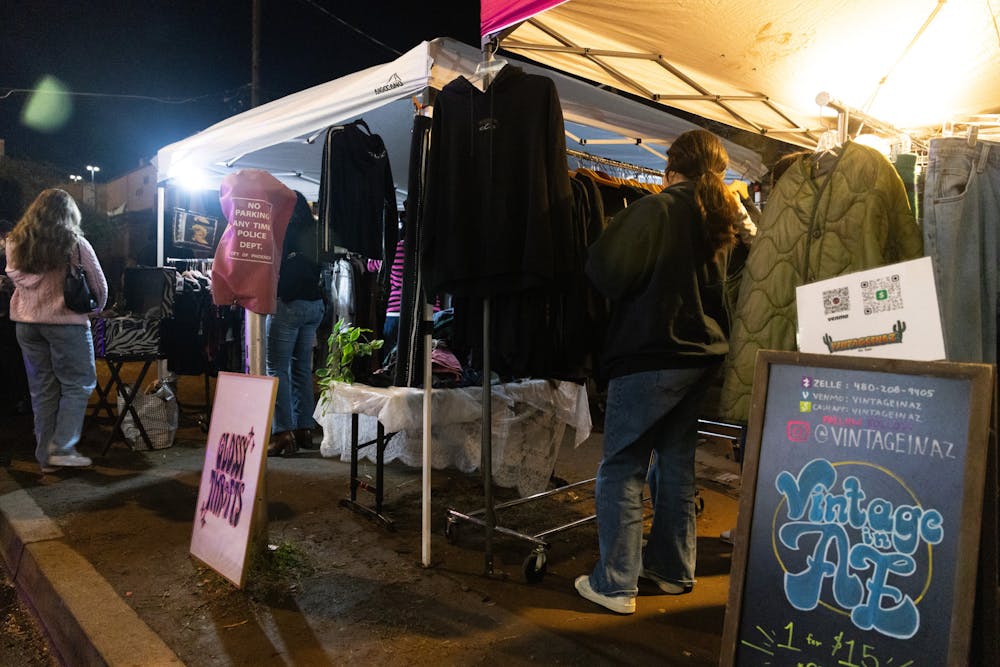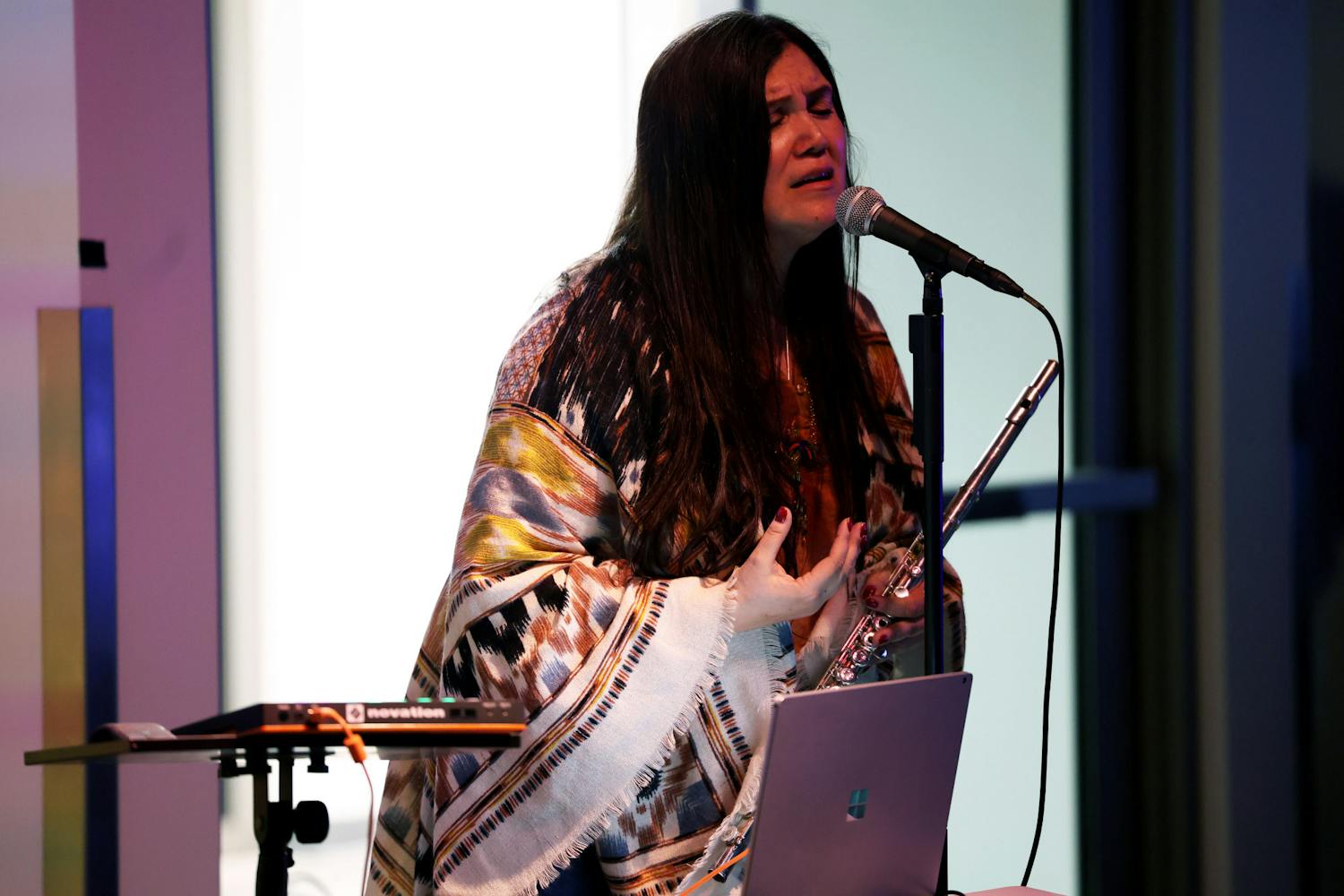Thrifting used to be a money saving tactic. Now, groups of fashion-forward students walk open-air thrift markets skimming racks and enjoying the activity.
Social media is to thank for thrifting's rise in popularity. TikTok influencers' hauls have captured the attention of millions of young people. They still promote consumerism, but in a way that is both sustainable and affordable.
This rise in content has drawn even more people to big thrift chains like Goodwill, which provides a traditional shopping experience. But it has also popularized the Goodwill Bins, where giant crates of clothing are sorted through by shoppers and paid for by the pound.
As thrifting has grown in popularity, it's become a business opportunity for many. Reselling clothes has become a common side hustle, and for some, a full-time job.
Resellers purchase clothes in bulk, usually from inexpensive sources like the Goodwill Bins. These clothes are then resold in small businesses, like the ones at ASU's University Street Market, which owner Eddie Pan describes as "a sustainable community-focused initiative designed for the student body."
When Pan first moved to Phoenix, he said he noticed the absence of a thrifting scene. He was shopping at a local Goodwill when he met a group of like-minded ASU students.
"I was talking to these kids, telling them, 'Hey, it would be cool to have a flea market on your campus,'" he said. From there he started University Street Market, which was initially focused on money. Now, he said, his outlook has changed.
"And now it's like, I'm connecting with people that are like-minded and want to build something in the city," Pan said.
Resellers have a science, carefully curating their inventory to reach a certain audience and its aesthetic.
"It is more of a Y2K feeling with pops of color," said reseller Alexis Cavalieri, a freshman studying biological sciences, about her shop knightinclothing. "You can always add a piece of Y2K clothing or jewelry to any outfit and it's gonna be a good outfit."
Reseller Jake Voegtle, a sophomore studying business entrepreneurship and owner of the ironically-named shop grossoldclothes said that he didn't expect his passion for vintage to become a career.
"I was just collecting vintage clothes for myself, and after a while, I realized that I had way more than I knew what to do with and it was taking up a lot of space in my house," Voegtle said.
Now, he said he enjoys making money off of thrifting while showing people cool, high-quality fashion.
Purchasing secondhand doesn't only ensure that clothes will be unique — it is also a sustainable way to shop. Pan said his main mission was to promote sustainability among youth.
"By hosting the flea markets we aim not only to promote our culture of sustainability but to contribute positively to the environment," Pan said.
Voegtle said he found thrifting to be an effective way to protect the Earth and other people.
"Keeping clothes in the cycle is good for the world and doesn't promote cheap labor overseas," Voegtle said.
Although shopping from resellers benefits the environment, discussion has emerged surrounding the ethicality of the process, especially when it concerns lower-income customers who have less access to quality clothing.
"I find that thrifting is sustainable and cheap, so people who don't have as much money have access to a more sustainable way of shopping," said Arbella Kasim, a junior studying psychology. "Resellers cut that short."
Madi Stutler, a sophomore studying graphic design, had a different view.
"I think reselling is perfectly ethical, it has never been something to bother me," Stutler said. "I know how much time it can take to find something cool and the reseller's time is worth something in my opinion."
Shopping secondhand, whether it be via resellers or a local thrift store, brings students closer to each other and to the community. It's a form of self-expression, an activity to bond with friends and a sustainable way to go against the capitalist grain.
"I love the excitement of thrifting," Stutler said. "I feel like finding something cool at a thrift store is ten times better than finding something cool at any other store. That rush of finding something perfect in racks full of random stuff is probably my favorite part, in addition to the sustainability of wearing secondhand clothing."
The resellers said events such as University Street Market bring them closer to the ASU community.
"The way that University Street Market works, it partners with a lot of different clubs on campus," Voegtle, who interns with University Street Market, said.
According to Voegtle, the partnerships include student organizations such as the Fashion Collective and the Undergraduate Student Government.
"It's a good opportunity to meet a lot of those people and build more connections," he said.
Cavalieri said that her job is an art that helps her to express herself and bond with the community.
"Just working with University Street Market overall really helps me connect not only to them, but to the students who just walk around and are looking for clothes," Cavalieri said.
Edited by Sophia Braccio, Alysa Horton and Caera Learmonth.
Reach the reporter at ebmosier@asu.edu and follow @eleribmosier on X.
Like The State Press on Facebook and follow @statepress on X.
Eleri is a senior studying interdisciplinary studies, english and sociology. This is her third semester with The State Press. She has also worked in retail.




